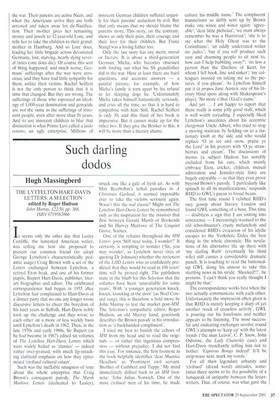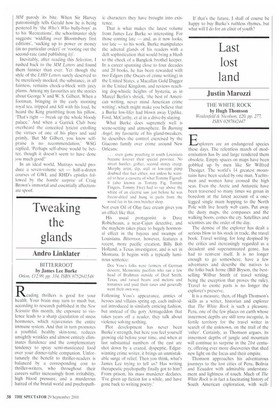Such darling dodos
Hugh Massingberd
THE LYTTELTON HART-DAVIS LETTERS: A SELECTION edited by Roger Hudson John Murray, .f22.50, pp. 368, ISBN 0719562066 It seems only the other day that Lesley Cunliffe, the lamented American writer, was telling me how she proposed to present our common friend (to adopt George Lyttelton's characteristically pedantic usage) Craig Brown with a set of the Letters exchanged between Lyttelton, a retired Eton beak, and one of his former pupils, Rupert Hart-Davis, publisher, literary biographer and editor. The celebrated correspondence had begun in 1955 after Lyttelton had complained to Hart-Davis at a dinner party that no one any longer wrote discursive letters to cheer the boredom of his later years in Suffolk. Hart-Davis nobly took up the challenge and they wrote to each other on a more or less weekly basis until Lyttelton's death in 1962. Then, in the late 1970s and early 1980s, Sir Rupert (as he had become in 1967) edited six volumes of The Lyrtelton Hart-Davis Letters which were widely hailed as 'classics' — indeed rather over-praised, with much lip-smacking clubland emphasis on how they epitomised 'civilised cultural values'.
Such was the ineffable smugness of tone about the whole enterprise that Craig Brown's consequent parody, The Marsh Marlowe Letters (dedicated to Lesley),
struck one like a gale of fresh air. As with Max Beerbohm's lethal parodies in A Christmas Garland, it seemed impossible ever to take the victims seriously again. Wasn't this the real classic? Might not The Lyuelton Hart-Davis Letters be remembered only as the inspiration for the missives that flew between Gerald Marsh of Bookends and Sir Harvey Marlowe of The Unquiet Grove, Staines.
One of the refrains throughout the MM Letters goes 'Still read today, I wonder?' It certainly is tempting to wonder (`Sir, you may wonder', as Lyttelton never tires of quoting Dr Johnson) whether the reviewers of the LHD Letters who so confidently predicted that they would be read in 100 years' time will be proved right. The publishers state in the blurb for this Selection that the volumes have been 'unavailable for some years'. With 'a younger generation knock, knock, knocking at the door' (as Noel Coward sang), this is therefore a bold move by John Murray to test the market post-MM. The Selection's sympathetic editor, Roger Hudson, an old Murray hand, graciously describes the Brown parody in his introduction as 'a backhanded compliment'.
I tried my best to banish the echoes of MM from my head and to read the originals — or rather this ingenious compression — without prejudice. I did not find this easy. For instance, the first footnote in the book helpfully identifies 'dear Maurice Headlam' as 'Prominent civil servant. Brother of Cuthbert and Tuppy.' My mind immediately drifted back to an MM footnote: 'John Julius Norwich. One of the most civilised men of his time, he made culture his middle name.' The complacent mannerisms so deftly sent up by Brown make one wince and wince again: 'agreeable'; 'dear little plebeian"; 'we must always remember he was a Harrovian'; 'she is to me what the Holy Ghost was to the Corinthians'; 'an oddly underrated writer me judice'; 'but if you will produce such easy and charming people to sit next to, how can I help bubbling away?'; 'no less a person than the Duchess of Kent, for whom I fell hook, line and sinker'; 'my colleagues insisted on taking me to the pictures, if you please'. As Lyttelton himself put it (a propos Jane Austen, one of his literary blind spots along with Shakespeare's plays), 'No more o'that i'God's name.'
And yet I am happy to report that there really is some jolly good stuff, which is well worth rereading. I especially liked Lyttelton's anecdotes about his eccentric clergyman Uncle Albert, who tried to stop a moving staircase by holding on to a stationary knob at the side and who would replace '0 ye ice and snow, praise ye the Lord' in his prayers with `0 ye strawberries and cream'. The discussions of menus (a subject Hudson has sensibly excluded from his cuts, which mainly embrace Eton, cricket, children, mutual admiration and Jennifer-style lists) are hugely enjoyable — so that they even prove beyond Brown's parody. 'I particularly like spinach in all its manifestations,' responds RHD to GWL"s paean to broad beans.
The first time round I relished RHID's racy gossip about literary London and found GWL something of a bore. This time doubtless a sign that I am sinking into senescence — I increasingly warmed to the old schoolmaster's crusty melancholy and considered RHD's evocation of his idyllic escapes to the Yorkshire Dales the best thing in the whole chronicle. His revelations of his alternative life up there with 'my darling Ruth' (eventually his third wife) still carries a considerable dramatic punch. It is touching to read the buttonedup GWL doing his utmost to take this startling news in his stride: `Shocked!!!', he protests. 'I can't think you really thought I might be that.'
The correspondence works best when the two actually communicate with each other. Unfortunately the impression often given is that RHD is merely keeping a diary of yet another 'week of ceaseless activity', GWL is pouring out his loneliness and neither appears to be listening. The most successful and endearing exchanges revolve round GWL's attempts to 'keep up' with the latest trends ('the man Leavis', C. P. Snow, John Osborne, the Lady Chatterley case) and Hart-Davis trenchantly telling him not to bother: 'Expresso Bongo indeed! It'll be strip-tease next, mark my words.'
For all their legendary urbanity and 'civilised' (dread word) attitudes, sometimes there seems to be the possibility of a batsqueak of antipathy between the letterwriters. That, of course, was what gave the MM parody its bite. When Sir Harvey patronisingly tells Gerald how he is being pestered by 'the Who's Who bully-boys' as to his 'Recreations', the schoolmaster slyly suggests: 'widdling over Bloomsbury first editions', 'sucking up to power or money (in no particular order)' or 'rooting out the second-rate (and publishing it)'.
Inevitably, after reading this Selection. I rushed back to the MM Letters and found them funnier than ever. Yet though the style of the LHD Letters surely deserved to be mercilessly mocked, the substance, in all fairness, remains chock-a-block with juicy plums. Among my favourites are the stories about George V and W. S. Gilbert. When a footman, bringing in the early morning royal tea, tripped and fell with his load, he heard the King grumbling from his pillow, `That's right — break up the whole bloody palace.' And when a Garrick Club bore overheard the conceited lyricist extolling the virtues of one of his plays and said primly, 'But Mr Gilbert, you know selfpraise is no recommendation.' WSG replied, 'Perhaps self-abuse would be better, though it doesn't seem to have done you much good!'
In an ideal world, Murrays would produce a seven-volume set — half-a-dozen courses of GWL and RHD's epistles followed by the bombe surprise of Craig Brown's immortal and essentially affectionate spoof.







































































 Previous page
Previous page